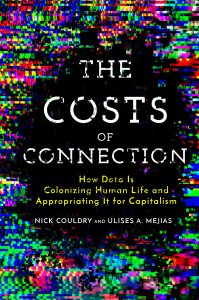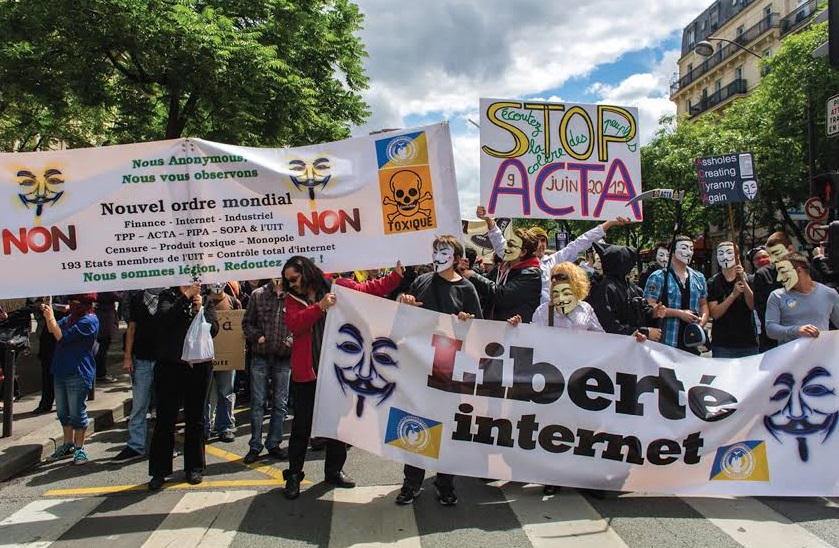
 In this series, we discuss data colonialism, a concept which is explored by LSE Professor Nick Couldry and Associate Professor Ulises Mejias of the State University of New York Oswego in their 2019 book, The Costs of Connection. In previous instalments, LSE PhD researcher Anri van der Spuy interviewed Professor Couldry to gain a foundational understanding of data colonialism, followed by an exploration of the impacts of data colonialism for inequality. In today’s instalment, she interviews Ulises Mejias.
In this series, we discuss data colonialism, a concept which is explored by LSE Professor Nick Couldry and Associate Professor Ulises Mejias of the State University of New York Oswego in their 2019 book, The Costs of Connection. In previous instalments, LSE PhD researcher Anri van der Spuy interviewed Professor Couldry to gain a foundational understanding of data colonialism, followed by an exploration of the impacts of data colonialism for inequality. In today’s instalment, she interviews Ulises Mejias.
Last week, using the example of the #DataMustFall campaign in South Africa, we asked whether countries in especially the global South are inadvertently exposing their citizens to the risk of data colonialism by promoting digital inclusion as a developmental prerogative. This week, in a detailed Q&A, we pick up on these ideas and ask Prof Mejias about his proposal for data nationalism as a potential way of rebalancing the digital scales in favour of global South countries.
Q: The notion of data colonialism introduces a contradiction of sorts: as we become more connected and dependent on technology (simultaneously gaining access to new opportunities and conveniences), we also lose control of our data. Who should bear the responsibility of balancing this contradiction – policymakers, the private sector, or users themselves?
Mejias: Different stakeholders will have different approaches to balancing this contradiction. Some will see it as an injustice that needs to be corrected by completely rebuilding the system. Others will try to correct this “minor inconvenience” through policies that make the injustice more “liveable” or easier to put up with. One of the benefits of seeing this as a continuation of colonialism is that it makes us realize that there isn’t a single solution that needs to be undertaken by a single party to solve this. We are in it for the long haul. Data colonialism represents a battle not simply over resources, but over meaning. And those kinds of battles play out over long stretches of time, and are never fully resolved.
 You mention in The Costs of Connection that data colonialism could have more serious repercussions for marginalised communities or developing regions. Why is this the case?
You mention in The Costs of Connection that data colonialism could have more serious repercussions for marginalised communities or developing regions. Why is this the case?
Mejias: That has always been the case in colonialism: the costs are unevenly distributed. Women have paid a heavier price. Ethnic minorities have paid a heavier price. Why would we expect data colonialism to be different? Marginalized groups experience more digital surveillance. Women and gender nonconforming groups experience more online harassment. People in developing areas pay more to access resources, even if those resources are “free” (Facebook’s FreeBasics program for the Global South is a good example: free internet access, if by that we mean free access to Facebook and what Facebook allows you to see, while being tracked). That’s why we say that data colonialism not only introduces new forms of oppression, but that those are built on top of the old forms of oppression that haven’t gone away.
Given that only about a half of the world’s population is online, might offline communities be avoiding the risks of data colonialism? In other words, are people who are not participating in contemporary network societies less vulnerable to exploitation, or are they still producing data fumes (even if unwittingly so) and thus participating in processes of data colonialism?
Mejias: The thing about colonial infrastructures is that they end up impacting everybody, not just those with direct connections to the empire. Remote villages in India or Brazil also paid a price during colonialism, even if indirectly (sometimes even higher costs, precisely because the value of their lives and lands was assumed to be null to begin with). What I’m basically saying is that there are environmental, economic and political costs that are paid by those who are not direct participants in data colonialism. They also end up paying for the environmental cost of the dam that powers the data centre, or the economic cost of the subsidies that go to foreign companies instead of healthcare or education, and so on.
A Senegalese daily newspaper has reportedly raised questions about so-called epidemiological colonisation (‘coronisation’) of Africa through the coronavirus (COVID-19), asking whether Europeans in particular are guilty of exposing otherwise unaffected regions to the pandemic. What, if anything, can we learn from other forms of colonisation when it comes to our relationship with data?
Mejias: When we say that data colonialism is a “new” form of colonialism, it means that we are not making a one-to-one comparison with what happened in the past, but that there are continuities between the old colonialism and the new colonialism that should alarm us. Yes, the modes, intensities, scales and contexts of historic colonialism are different than those of data colonialism. There is no brutal physical violence; there is no racialized slavery. However, we are saying that there is one key similarity: the historical function is the same, and that function is to dispossess. There is no way to understand our present world without colonialism, which is why we are able to understand the subtext behind the story about “coronisation.” This is because the legacy of colonialism (what Peruvian sociologist Anibal Quijano would call the coloniality of power) is still with us, and shapes our world. Data colonialism is simply the expression of the coloniality of power for the age of Big Data, AI and mass surveillance.
Some have argued (e.g., Jaron Lanier in The New York Times) that we have been ‘tricked’ into giving away our most valuable assets freely, but that a potential solution would be to get compensated for our data individually. What do you think of this proposal?
Mejias: In our book there is a section where we compare some Terms of Use agreements from data platforms to the Spanish Requerimiento, a document conquistadors read in Spanish to a non-Spanish-speaking native American audience before they took away their property (and often, their lives).
Both documents, we argue, trick us into giving away something by re-defining it in a manner that is incomprehensible to us. That is the quintessential colonial move. Of course, in the case of the conquistadors there was really no question of consent, of clicking “I Accept” before entering into a relationship with the colonizer. But what is similar is the use of an abstract language to carry out the act of dispossession. Given that this dispossession has already taken place at a massive scale, is the solution for us as individuals to be paid for the data we produce?
I don’t think this solution goes far enough for a couple of reasons. First, it’s a very neoliberal response, focusing on the individual at the expense of the collective. Yes, Lanier and others suggest that unions could be formed to handle the collection and distribution of payments, but in the end the idea (like the idea behind Universal Income) is that the problem is solved once each individual “gets theirs.” Clearly, as we are seeing right now with the coronavirus, we need solutions that work at the level of the social, not just the individual. Secondly, this solution again leaves the fundamental problem of data colonialism, the problem of extraction and appropriation, intact. In fact, it normalizes it, by telling people: “We are going to continue the extraction, but here are a few pennies for your troubles.” It is slightly better than the Requerimiento, but not by much.
In a recent piece on Al Jazeera, you argue that global South countries should take ‘the bold step to declare data a national resource, nationalise it, and demand that companies like Facebook and Google pay for using this resource so its exploitation primarily benefits the citizens of that country’. Do you think this proposal is feasible, and why?
Mejias: That piece started more as a thought exercise, but what’s interesting is that during this COVID-19 crisis, we have heard mainstream government officials (NYC mayor De Blasio, for one) talk about nationalizing the medical equipment supply industry, the airline industry, etc. So I guess nationalization does not seem so radical anymore! Still, I don’t think we will see any moves towards nationalizing data any time soon. My point was simply that if corporations like Facebook and Google make billions of dollars in profits by exploiting a resource that can be said to belong to a foreign country, we could easily conceive of a tax that these corporations would have to pay for using that resource. This would allow us to address the problem at the national level, not just the individual level. Yes, it would not solve the fundamental problem of extraction and exploitation. But if the choice is between appropriating a resource without giving anything back, and having to pay something that nations can use to begin to dismantle the mechanisms of extraction, why not?
Your book is accessible for and relevant to a broad audience. What key message would you want policy makers to take from the book?
Mejias: Perhaps policy makers could gain a useful framing device by reading our book, but unfortunately the problem is NOT that policy makers don’t understand the problem, or can’t think of solutions. The problem is that in most cases policy makers are beholden to power and money first, not to people. I acknowledge that there are well-intentioned progressive policy makers here and there, but frankly in order to really change things through policy, a substantial portion of the people in government would need to change. It looks like only a cataclysmic crisis like the one we are experiencing can begin to enable that. I’m hopeful that in addition to disaster capitalism, there is also such a thing as disaster anti-capitalism and disaster anti-colonialism.
Do you think policy proposals like the UK government’s Online Harms White Paper in response to online risks and contemporary data scandals are able to address the underlying concerns you express in The Costs of Connection?
Mejias: I’m not too familiar with it, but after a quick look, a couple of things strike me as noteworthy. First, it seems to focus on protecting and preventing “illegal and harmful” activities. Its intent seems to be to provide a safe space (mostly for children and vulnerable populations, it says). That’s all well and good. But we have to remember that policing functions always have political consequences. Yes, no one wants to be the target of cybercrime or harassment. But today, the answer to all safety concerns seems to be more surveillance and more data extraction.
The COVID-19 pandemic is a clear example of this. Like we saw in the aftermath of 9/11, we are starting to see opportunistic attempts by governments to undermine civil liberties in ways that might endure beyond the pandemic. But this time, the surveillance relies a lot more on data tracking and AI. Is that the solution that this white paper envisions? The other thing is that the white paper says the proposal “supports innovation and a thriving digital economy.” To me, that’s the same thing as saying that, when push comes to shove, the public will pay the price (through increased surveillance), and corporations’ interests will be protected.
But again, I would need to take a closer look at the proposal. In the end, these kinds of solutions don’t really address the problem we are outlining in our work because they don’t really do anything to question the continuous extraction of data from our lives for the main purpose of generating corporate profit. They are leaving the fundamental problem, the colonial appropriation of life, intact.
You mention in The Costs of Connection that it is not too late to challenge the prevailing logic of data colonialism; that there is still hope for changing the course of history we find ourselves on. How do we do this?
Mejias: It is tempting to think that one law, one technology, or one individual can challenge the logic of data colonialism once and for all. In truth, we will need multi-dimensional solutions that unfold and adapt across long periods of time. I said earlier that this is basically a struggle over meaning, and the wonderful thing about such struggles is that they can be fought with minimal resources, if necessary. We have seen again and again that imagination and creativity are essential tools for the anti-colonialist. And they will continue to be. We need imagination and creativity to decolonize time and space: the intimate time we waste generating value for a corporation, the intimate space invaded by a corporation’s AI algorithms.
People are reigniting their love for social media during the coronavirus pandemic because, as we retreat into quarantined spaces, it’s the only thing connecting us to the rest of the world. But after a while, I think (I hope) this colonized space and time will feel claustrophobic and unsatisfying. Not because it is not productive, but because it is utterly commodified and tracked, and because it is used to sell us our lives back to us. We are not saying there is no value in using social media at this time. We are saying there’s a cost. I hope people will remember that we can have human connection without corporate interference, without paying that cost. Or maybe they won’t; maybe data colonialism will become the new normal for a time. But even if that is the case, there is always hope, because we can always imagine a better tomorrow.
Q: What is your hope for our future relationship with digital technology?
Mejias: One of constant questioning, where we can always look back and examine what technology has made it possible for us to forget.
This article represents the views of the author and not the position of the Media@LSE blog, nor of the London School of Economics and Political Science.





